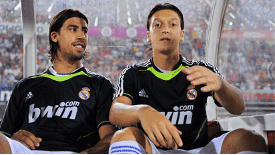
Set your mind at ease, this article is not an early preview for the December 10 el Clásico. It has no intention whatsoever of pointing out the fact that Leo Messi and Cristiano Ronaldo are useful footballers, or that 142 percent of the world’s population will be tuning in, or indeed that the players involved have between them won every single sporting gong ever conceived. Undoubtedly, all that and much more looms inevitably on the horizon. But for the moment, hold off on decommissioning all your electronic devices and moving to Greenland.
Let us instead ponder the upcoming European championships. We now know who will be there and who will not. We also have a vague idea of how they may be drawn. We have seen a moderately interesting series of friendlies. And at the conclusion of all that, it seems that the two teams most likely to corner the glory come the summer are Spain and Germany.
Spain have failed to hit the right notes in their most recent outings. But class surely will tell and it would be folly to consider them anything but favourites. The quality in the side is beyond argument. There has, however, been some doubt expressed over their so-called tika-taka fundamentalism – an obdurate refusal (some would prefer inability) to deal in variants of the game that fall short of their pass-and-move utopia. And while the baubles in the cabinet are difficult to disregard, there is now sufficient evidence to conclude that if the intensity and conviction in said style of play drops, it transforms handily to dust beneath the wheels of a well-parked defensive bus.
In response to recent difficulties, Vicente del Bosque’s team has sought to find solutions by emulating its Siamese twin, FC Barcelona. The attempt at using David Silva as a pseudo-Messi and the deployment of Cesc Fàbregas in the capacity of a withdrawn forward (as opposed to a central playmaker) are sure signs of the inextricable ties that bind the two teams – beyond having a sizeable contingent of common players. So it follows quite logically that signs of the apparent fallibility of one should be accompanied so closely by equivalent signs for the other.
Perhaps Spain’s lapses in recent months have also been exaggerated by the scintillating form of Germany. Playing with extraordinary speed and precision, the raw talent on show at last year’s World Cup appears to have developed into a formidable unit. The recent dismantling of the Netherlands saw myriad examples of the swift, incisive and deadly attacks that have become characteristic of the side. They are undoubtedly the coming force, growing in strength and confidence with each game. Joachim Löw is an immensely shrewd tactician, and after being thwarted twice by Spain in as many major tournaments, it is inconceivable that his team’s development since South Africa has failed to countenance the need for a style of play that will prove effective against the Spanish.
Real Deutschland?
Science tells us that if an experiment carried out independently in two distinct environments produces a similar result, that result probably deserves to be taken seriously. It’s interesting then that viewers of the Germany vs Netherlands friendly could – by squinting a bit – have almost convinced themselves that the side in white was actually Real Madrid. The same Real Madrid constructed with the express purpose, after several seasons of humiliation, of overcoming their arch nemesis, Barcelona. The team put together by the most successful coach of recent times, José Mourinho.
The similarity is not restricted to the players Madrid and Germany have in common – Sami Khedira and Mesut Özil – although they do each play nearly identical roles for club and country. There is little negativity about either side. The patterns of play are remarkably similar, as is the way they are set up tactically. Even when considered player-for-player in a typical lineup, there is a striking correspondence. Xabi Alonso and Bastian Schweinsteiger perform identical functions. The three attacking players in front of the deeper midfielders for both sides are quick, skilful, and very capable of scoring goals – Cristiano Ronaldo, Özil and Ángel Di María for Madrid; Thomas Müller, Özil and Lukas Podolski for Germany. Even the lone striker, Gonzalo Higuaín (or indeed Karim Benzema) for Madrid and Miroslav Klose for Germany plays in a similar fashion.
While it will be impossible for Löw to know exactly how well his side will match up against Spain, he will probably get a fair idea from watching el Clásico. Del Bosque may well have mixed feelings – though Madridismo runs deep in his veins, a victory for his old team could reveal the need for an alternate plan for the Barça-esque Spain. Understanding the implications of the game and adapting to them may go a long way in determining who has a more enjoyable summer holiday.
Leave a Reply
You must be logged in to post a comment.